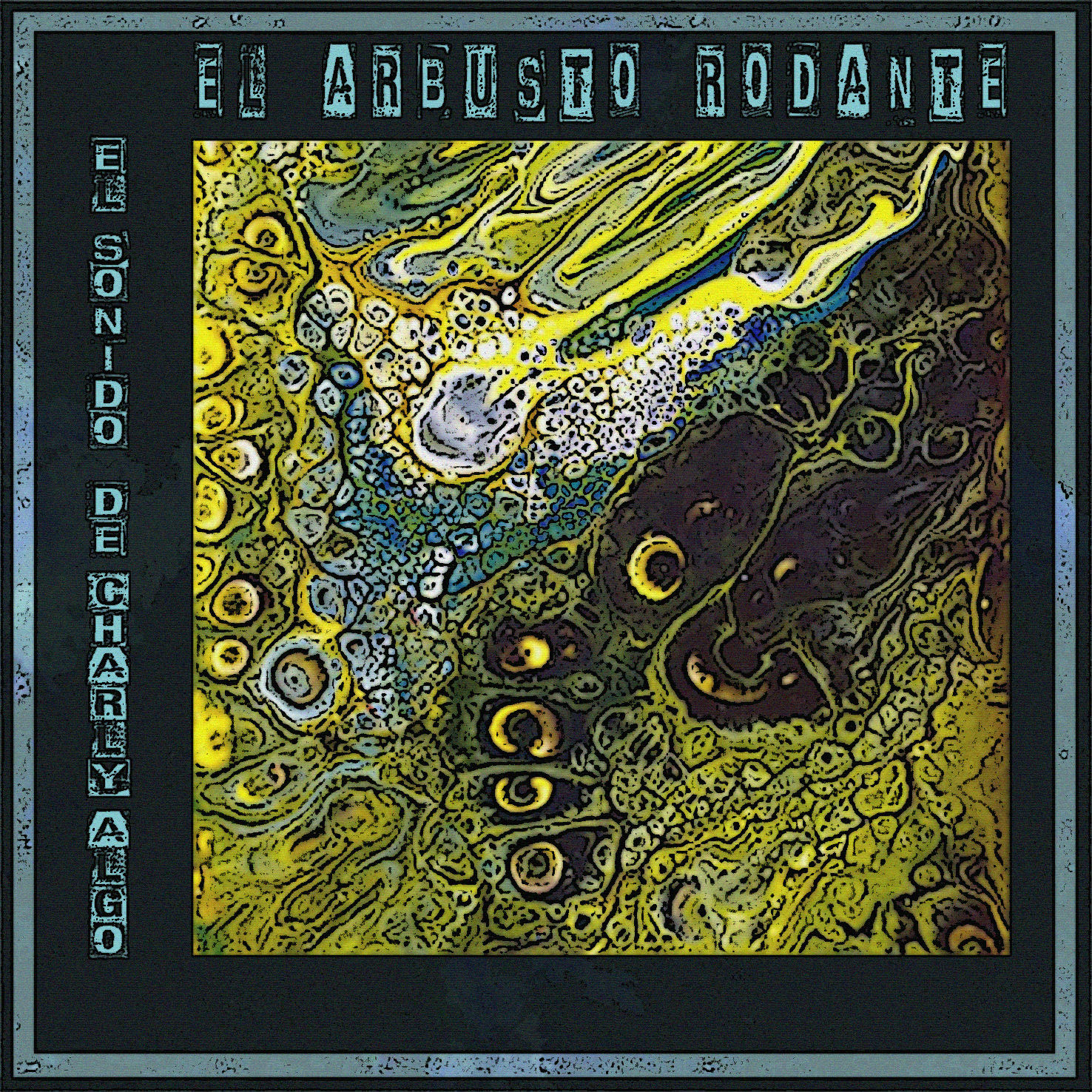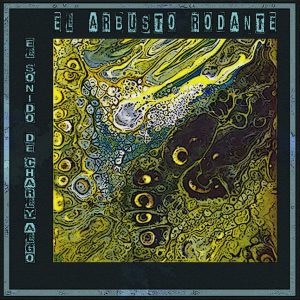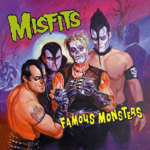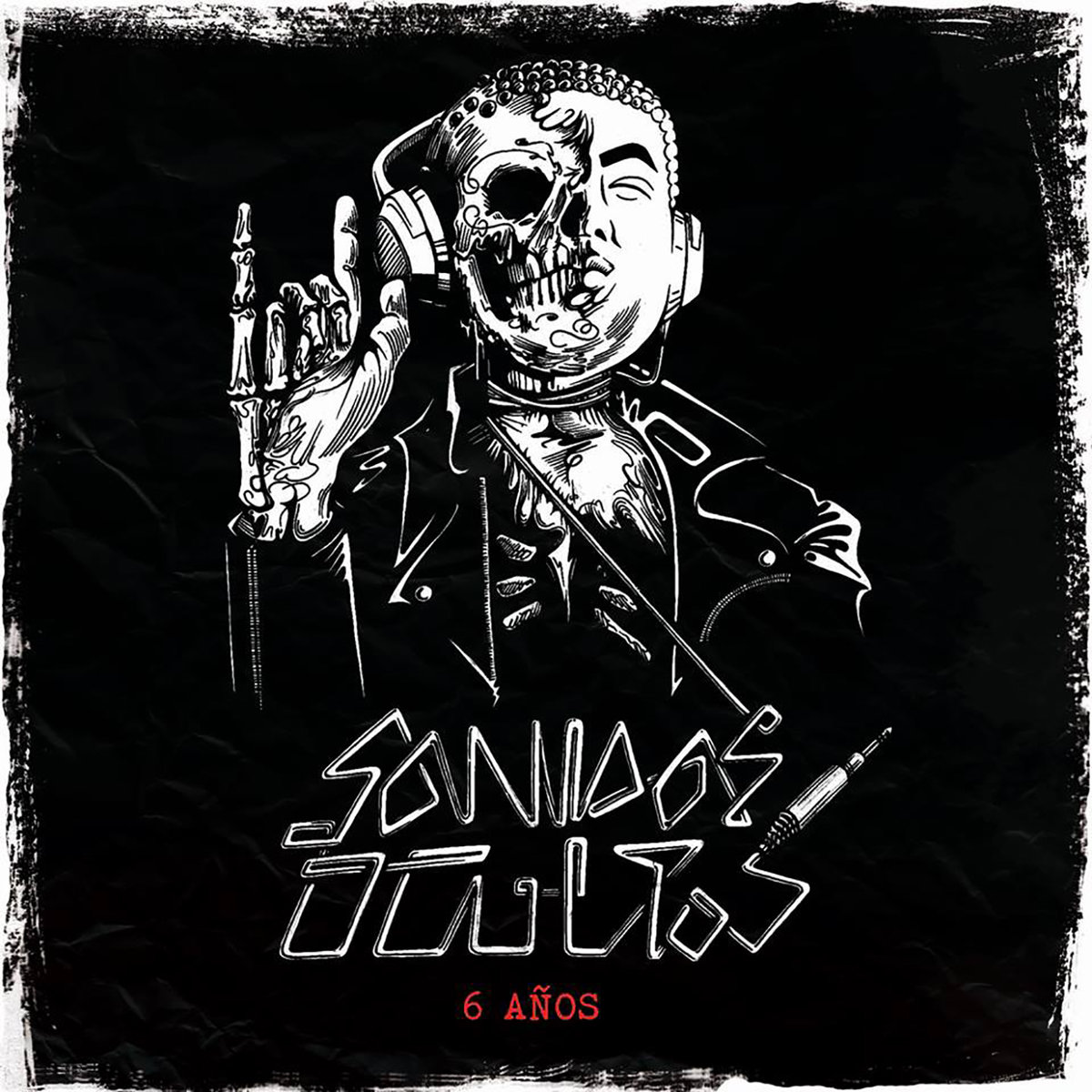

El Arbusto Rodante – El Sonido de Charly Algo (2018)
martes 19 de junio, 2018
Escrito por: Álvaro Molina


- El Arbusto Rodante
- El Sonido de Charly Algo
- ¡Haz clic para puntuar esta entrada!(Votos: 0 Promedio: 0)
- Escucha nuestra música
Imagine usted, estimado lector, que un día cualquiera se topa con los antiguos equipos AM de antaño. Desempolvándolo y con la esperanza de que funcione, de improviso el dial empieza a sonar y aparece un tema como “Nuestras Alas Negras” y resulta inevitable quedarse pegado a la radio como en una tarde de happening con Los Ángeles Negros o Los Vidrios Quebrados. Una y otra vez, la fórmula sentimental de estas canciones causa un apego especial. Como el telón de fondo musical en el calor de una tarde de verano con cervezas baratas o una larga noche invernal al brasero de los vinos y cigarros. ‘El Sonido de Charly Algo’ se siente como una invitación a envolverse en el particular e interesante espíritu de este cuarteto maldito.
Hace diez años, estos autodefinidos semidioses egipcios con cabeza de pájaro debutaban en vivo. No tengo idea de cómo habrán sido esos tiempos de gestación, pero imagino a un grupo de amigos que seguían el sello de la rebeldía del rock & roll. Con el tiempo a sus espaldas, el 2010 llega “Maldigo las Anclas” y comienzan a llamar la atención en lo que se identificó como unos locos tipos que, con variados rastros de influencias musicales, resucitaban el lado más oculto (u ocultista si se quiere definir más precisamente) de las ánimas rebeldes del rock. Así, poco a poco, El Arbusto Rodante se fue convirtiendo en un regalón de Radio Futuro (suena por ahí algo como “La Carpa del Diablo”), teatros, clubes, bares y hoteles del país, iluminando las cantinas humeantes y vaciando los vasos y copas parroquianas.
Lo importante aquí es dejar en claro que no estamos hablando de meros placeres estéticos o esa idea de la maldición que trae consigo alabar inocentemente los tiempos antiguos de gloria cincuentera, The Rolling Stones, Them o los Stooges. A pesar de que hay señuelos en la música de El Arbusto Rodante que apuntan a esa dirección, el principal tiro de gracia está en ocupar un lenguaje similar, pero con un marcado sentimiento actual. Como si ese dial AM de “verano del amor” que hablábamos antes, ahora se actualiza y funciona impecablemente. No es sólo rock & roll; hay blues, R&B, algo de funk fiestero, (neo)psicodelia británica y mucha, mucha sensualidad en la propuesta. Es una banda que funciona bien, que suena compacta y que no tiene pecados de pretensión entre sus miembros.
Este club de la serpiente está conformado por Jorge Parker (bajo), Jorge Squella (batería) y los fundadores Alonso Cid (guitarra) y Rorro “Rana” Aldana (voz). Como decía antes, no es sólo estética de antaño o la fórmula de líder-banda-de-apoyo. Bastan un par de temas de ‘El Sonido de Charly Algo’ para darse cuenta de cómo funciona su lenguaje. Si pudiera hacer un ultra-resumen, sus pilares se encuentran en la revalorización de “lo que tienen para decir las letras de las canciones” y un sonido musical directo y honesto. Escucha “Evolution Revolution” y su historia sobre abandonar las idioteces de un dandy privilegiado fumador de habanos caros y borracho de champagne francés, para viajar al sentido tribal y ritual originario, en clave de rock setentero que apela a un inconsciente nostálgico. Tienen una gracia particular en el manejo de las ironías y las metáforas; “Yo aprendí a reír y llorar, todo a la vez/Era un truco extraño que solía hacer para no volverme loco […] Yo solía orinar en la recepción cuando nadie me miraba/Había un tipo listo que gustaba hablar de comercio exterior”. Claro, no todos hemos sido culpables de mear en público (¿o sí?) y pecar de jet-set, pero es fácil identificarse con ese adiestramiento al que a veces nos exponemos. Y ahí nacen las ganas de despegarse y volver a los orígenes. Y sí, también hay letras en inglés: “The smoky apeman going back to Africa/Maybe Ethiopia, oh no/Gonna make a revolution there/Gonna make a revolution now, yeh, no”. Son visiones profanas sobre los impulsos más humanos, pero no estoy seguro de si es con alguna intención de sacramentar o sacralizar.
Dicen las antiguas historias que las Fata Morganas eran espejismos creados por Morgana le Fay, la hermanastra del Rey Arturo, con el fin de engañar a los marinos y llevarlos hacia su destino final en los océanos. La épica rendición de El Arbusto Rodante a este mito va de la mano con una psicodelia surrealista, donde el romanticismo de Ulises se apodera del espíritu de Rana Aldana para “seguir a fata morganas, espejismos y visiones vanas […] Hacia el lugar donde las mujeres los dientes llevan pintados/Hacia la isla donde los hombres adoran al diablo”. Ya sean collages poéticos de Baudelaire o planos cinematográficos de Godard, la facilidad con que El Arbusto Rodante logra conceptualizar sus canciones los convierte en una propuesta interesantísima de la cual a veces es difícil despegarse. En el tema que lleva el nombre del disco es posible resumir todo esto; con guitarras Keith Richard-escas, garage rabioso y la voz ahogada de Aldana, se entra en un crisol de ocultismo, sexualidad y concebir las reglas como algo que se debe romper. Para todos los interesados, la forma más fácil de sintetizar lo que digo es en el coro del tema: “Solo tienes que dejarte llevar/Entrega tu cuerpo a este ritmo violento/Baila en círculos”. La exhortación está hecha: bailen todos en círculos de la muerte al amparo de estos sonidos.
No sé que más puedo decir. Me gustaría hablar mucho más de este disco, pero no quiero aburrirlo querido lector. Quizás ahora sólo baste entregarse al ritmo, a fantasear con las entretenidas ironías y metáforas que este cuarteto de culto tiene para decir. Invite a sus amigos, descorche ese vino añejo y… bueno, el resto lo dejo a la imaginación. Pero, sin duda, es algo que recomiendo hacer.
(Reseña en inglés)
Dear reader: picture yourself on a random day, finding one of those old and rusty AM sound systems. Clean out the debris hoping this nostalgic piece of technology works. But suddenly, as in some kind of satanic ritual, the dial starts whispering a song like “Nuestras Alas Negras” and, in a hypnotized fashion, you just can’t stick yourself out of it, just like those ancient afternoon-happenings with Los Ángeles Negros, Otis Redding or Los Vidrios Quebrados. The formula of this bunch of songs has the singular feeling of causing a certain appeal, melancholia or whatnot. Sounds like the background of a hot summer afternoon with cold, cheap beer or long winter nights trying to get warm with cigars and strong doses of wine. ‘El Sonido de Charly Algo’ feels like an invitation to drop and submit oneself to the interesting and entertaining spirit of this doomed quartet.
Ten years ago, these self-described “Egyptian bird-headed demigods” were making their live debut. I really don’t know how those years of formation were like, but I can picture a damned group of friends following the zeal of rock & roll revolt. The weight of time brought ‘Maldigo las Anclas’ (2010) and the band started making noise with something identified as some crazy guys dreaming a wide variety of musical influences and the resurrection of dark and occult themes of classic rock rebellious ghouls. Cause-effect, El Arbusto Rodante became the blessed-children and sunflower-kissed cult of media like Chilean classic rock radio station Radio Futuro and venues that spawned a range of theatres, hotels, clubs, bars and wherever the band could be the spark that lit smoky canteens, emptying the glasses of crazy-assed habitués.
Therefore, we’re not talking about mere fin de siècle aesthetic pleasures or that cursed idea of innocently lauding the glorious past times of The Rolling Stones, Them or The Stooges. Though El Arbusto Rodante lures us to sounds of that kind, the main tour de force is in using a similar language, but with a desire of updating it to modern times. Feels like that rusty AM dial, blushed with a “summer of love” ethos of “morning maniac music” is now working neatly. It’s not just rock & roll; there are fair doses of blues, soul, R&B, British Invasion psychedelia and a whole lot of sensual vigour. And it works awesomely; the band sounds tightened with no sins of pretention among its members.
This LaVeyan group consists of Jorge Parker (bass), Jorge Squella (drums) and founding members Alonso Cid (guitar) and Rorro “Rana” Aldana (vocals). As I said before, it’s not just tarnished aesthetics or the boring formula of leader-backup-band. If I could ultra-summarize it, the foundations of this band are a revalidation of “the meaning and poetic undertone of songs” and an honest, direct musical expression. Just take a listen to “Evolution Revolution” and its story about a bored, expensive cigar smoker and French champagne drunk dandy that takes the step to go back to the original tribal rites of spring, in the key of 70s pop rock that appeals to our nostalgic unconscious. These guys have a really special way of managing the ironies and metaphors; “Yo aprendí a reír y llorar, todo a la vez/Era un truco extraño que solía hacer para no volverme loco […] Yo solía orinar en la recepción cuando nadie me miraba/Había un tipo listo que gustaba hablar de comercio exterior”. Of course, not all of us can plead guilty of pissing on public spaces (right?) and jet-setting sins, but it’s easy to identify with that domestic training we are exposed to in complex social life. And that’s the spark that enlightens us to escape, break away from the norm and go back to the origins: “The smoky apeman going back to Africa/Maybe Ethiopia, oh no/Gonna make a revolution there/Gonna make a revolution now, yeh, no”. These are profane visions of the most human impulses, but I’m not sure if it has a sacrament or sacralising pretension. Well, have it your own way.
The elder stories tell that Fata Morganas were mirages that Morgana le Fay, the witch stepsister of King Arthur, conjured to trick and guide seamen to their ultimate doomed destination at sea. El Arbusto Rodante’s epic rendition to this myth goes hand in hand with a surrealistic psychedelia, in which Ulises’s romanticism possesses the spirit of Rana Aldana, in order to “seguir a fata morganas, espejismos y visiones vanas […] Hacia el lugar donde las mujeres los dientes llevan pintados/Hacia la isla donde los hombres adoran al diablo”. Whether they may be Baudelaire-ish collages or cinematic Godardian screenshots, the guys from El Arbusto Rodante are mavericks when it comes to drench concepts on their songs. In the album’s title track, there’s a chance of summarizing all of this; with guitars in the like of Keith Richards, rebellious garage and the dried-out vocals of Aldana, it serves as an entrance to a melting pot of occultism, profane sexuality and the pathos of breaking rules. To all of you potheads interested in this, I can think of a better way to synthesize what I’m saying. Just take a listen to the chorus and its damned words: “Solo tienes que dejarte llevar/Entrega tu cuerpo a este ritmo violento/Baila en círculos”. Then, let us all pray to the exhortation of dancing in circles of death with these sounds.
I can’t think of much else to say. I’d surely love to babble more about this album, but I really wish not to bore you, dear reader. Maybe you just need to submit yourself to these rhythms, fantasizing with the entertaining ironies and metaphors that this cult quartet are storytelling about. Invite your friends, uncork that old wine and… well, the rest it’s up to your imagination. Though I definitely suggest you to do it.
Este artículo ha sido visitado 786 veces, de las cuales 1 han sido hoy




























